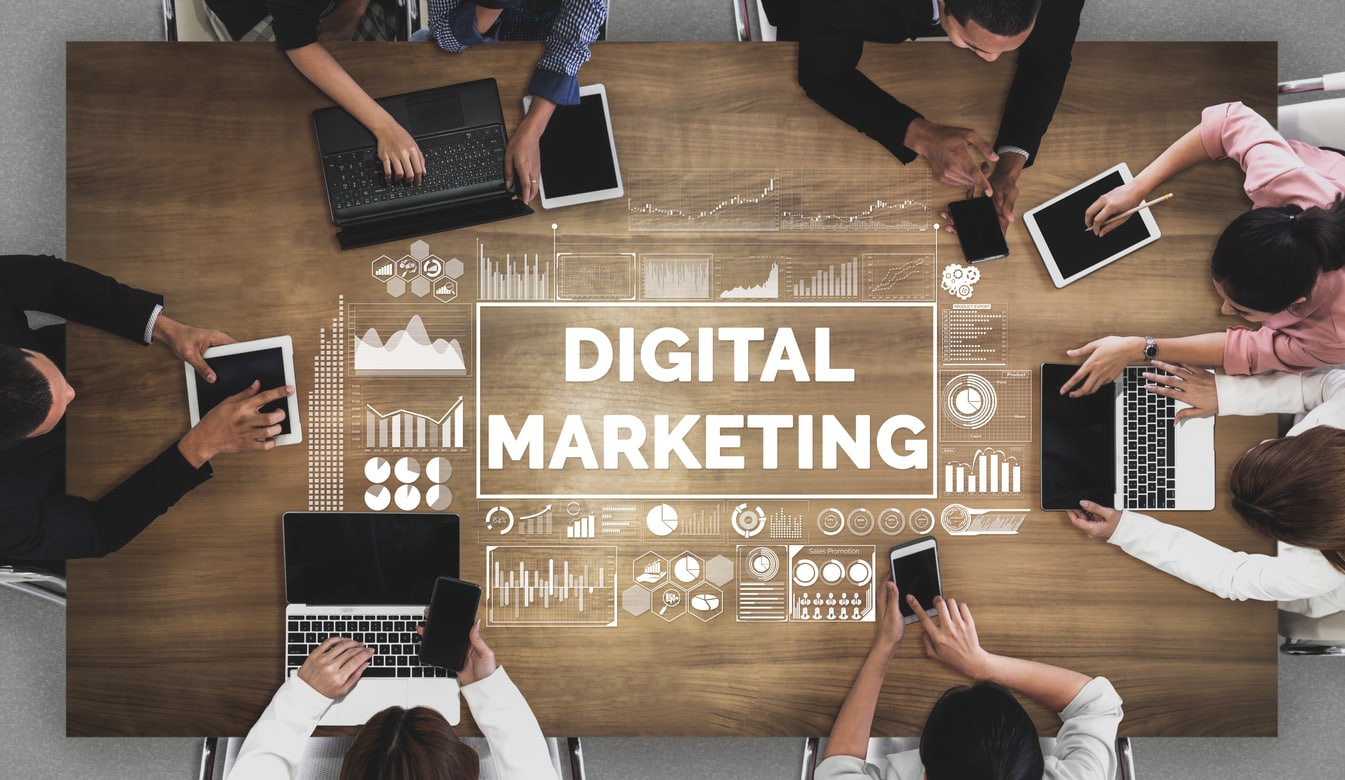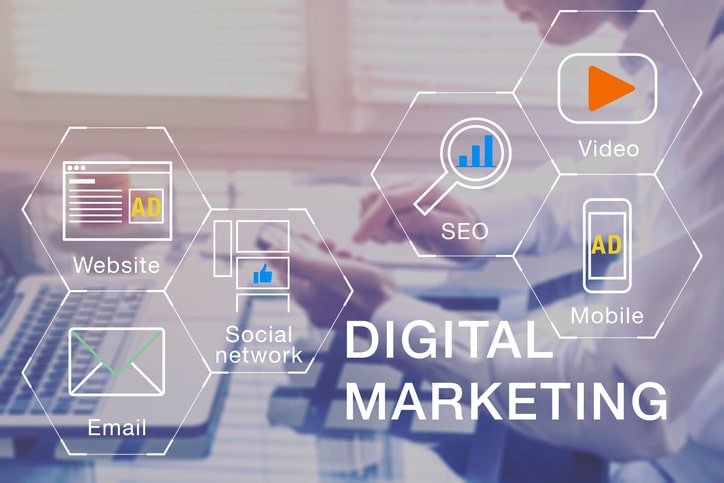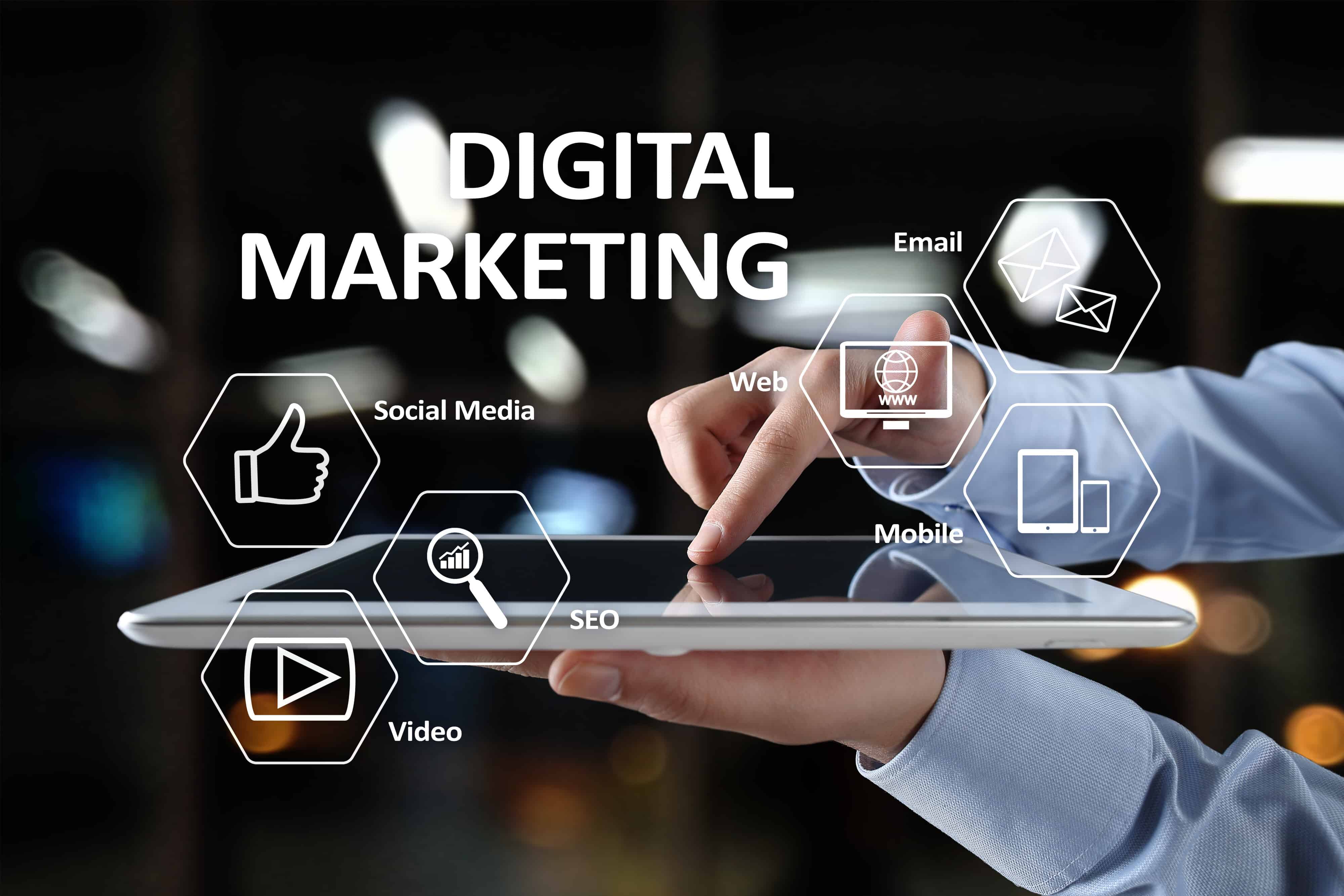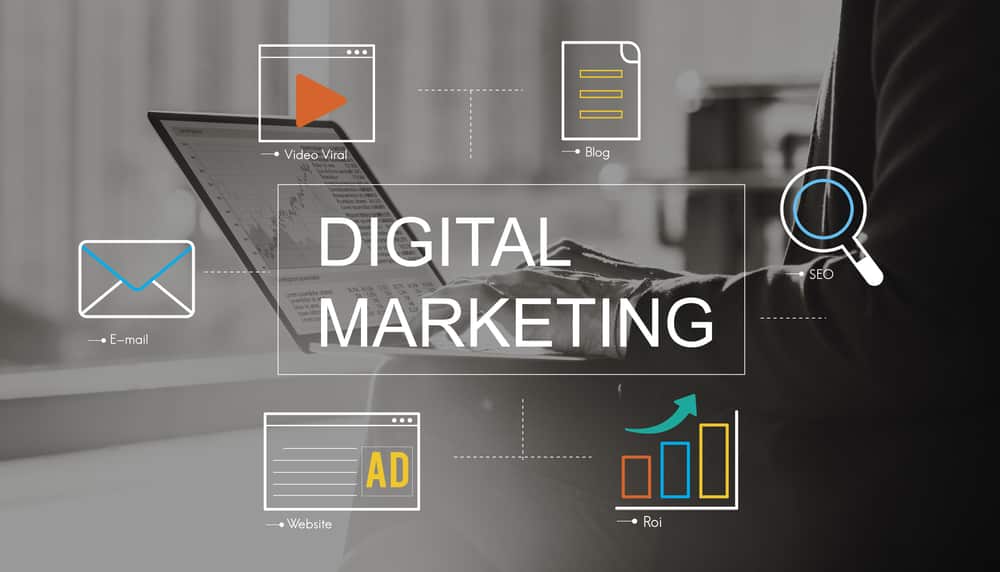- What does a Digital Marketer do?
- Digital Marketer Job Description
- How to Become a Digital Marketer?
- Skills Required for Digital Marketing
- Tools used by Digital Marketers
- What should I study to become a Digital Marketer?
- Types of Digital Marketing Jobs
- A day in the life of a Digital Marketer
- Digital Marketer Salary Overview
- Does Digital Marketing have a future?
- Challenges faced by Digital Marketers
- Challenge 1: The challenge of coping up with ever-changing landscape
- Challenge 2: The challenge of being consistent with Content creation
- Challenge 3: Meeting deadlines
- Challenge 4: Data Privacy
- Challenge 5: Maintaining Creativity
- Challenge 6: Keeping the message personalized
- Challenge 7: To be understood by their clients or decision-makers
- Challenge 8: Generating leads and increasing traffic
- Challenge 9: Keeping up with the competition
- Conclusion
- How to Manage the challenges?
In today’s digital era, a digital marketing career is one of the most sought-after career paths. Upskilling in this domain can help you advance in your career. In this blog, we’ll talk about the digital marketing job description, skills required to become a digital marketer, a day in the life of a digital marketer, and an overview of a digital marketing course.
Let’s get started!
What does a Digital Marketer do?
With a rise in digitalization and online brand presence, digital marketing is skyrocketing like never before. After all these years, this one stream has managed to establish its stance even amidst the cut-throat competition.
Every new business is seeking its presence online; hence, the need to have a professional digital marketer arises from there. It is estimated that in 2020, the global ad spend can reach $605 billion.
With all these new numbers and shining opportunities, do you wonder what a digital marketer does?
Digital Marketer Job Description
A digital marketing manager is liable for the development, implementation, and management of marketing campaigns that are fruitful enough for promoting a company and its services or products.
A manager plays an integral role in improving brand awareness within the digital market, increasing app and website traffic, and acquiring potential customers. Apart from that, a digital marketing manager also helps to discover and assess the latest digital technologies and web analytics tools to evaluate the website traffic to optimize email marketing campaigns, social media ads, and more.
How to Become a Digital Marketer?
Thanks to the internet being flooded with information, pursuing professional digital marketing is not tedious anymore. However, to ace this stream, it is essential to acquire a handful of skills, specific to the tasks. If you are new to the industry and want to start digital marketing from scratch, then enroll in this free digital marketing course offered by Great Learning.
Skills Required for Digital Marketing
Similar to any other position, a digital marketing career comes with a few requirements. To become a professional digital marketer, below-mentioned are the skills that you would need:
- Advertising Expertise:
Digital Marketing is all about advertising. Most of the time, just by learning how to boost a post, a majority of people call themselves online marketers. However, advertising is a profound subject with varying aspects. And, a person trying to work in this stream should learn everything about it.
- Sales Skills:
It doesn’t require only collecting leads; but, a good digital marketer should hold expertise in selling as well. Considering that it is all about results, companies would want to assess how better you can sell their brand before they hire you.
- Accurate Thinking:
Usually, marketers are considered passionate workers in their workplace. But, this passion can sometimes cloud the measurement and judgment of marketing initiatives and theories.
You must understand how to separate yourself from the work to focus on what is important at the moment.
- Analytical and Creative Abilities:
Digital marketing also requires both analytical and creative thinking. While several people may want to focus on one aspect, it is important to concentrate on both. Since digital marketing is strictly about measurements, everything – from campaigns to strategies – should involve adequate thinking.
Tools used by Digital Marketers
With the latest tools available out there, it has become easier for digital marketers to carry out their operations. So, here is a list of widely used tools that a majority of marketers use.
1. SEMrush
SEMrush is one of the most excellent and versatile tools used by marketers across the globe. It will not just help to provide an in-depth keyword list but also relevant information regarding keyword difficulty and search volume.
Key Features:
- Discover organic competitors
- Conduct backlink analysis
- Analyze competitors’ keywords and ads
- Evaluate competitors’ product listing ads
2. Hootsuite
Another significant one on the list is Hootsuite. Used by thousands of marketers and social media experts, this tool is capable of scheduling post updates and handling multiple social media pages at once.
Key Features:
- Schedule social media posts
- Manage social content seamlessly
- Measures social media output
- Prioritize essential conversations
3. Vimeo
Keeping in mind the trends revolving around videos, this type of content is gaining a lot of importance. Hence, to put forth HD, ad-free videos in front of the target audience, marketers use Vimeo for effortless results.
Key Features:
- Publish videos online
- Customize the player according to preference
- Advanced analytics to see how videos are performing
- Streamline feedback and gather the team
4. MailChimp
Within the email marketing domain, MailChimp is an absolute giant name. With billions of emails being sent with this platform, it turns out extremely usable. If you are new to digital marketing, this tool will be a perfect starting point.
Key Features:
- Automate marketing campaigns
- Integration of 300+ apps
- Inbuilt security tool
- Inbuilt analytics to keep a tab on marketing campaigns
5. Canva
A web-based design tool, Canva helps to create unique and pleasant images that can be shared across varied channels, including social networks, blogs, and more. Either you can create images from scratch or polish the existing ones with this tool.
Key Features:
- Get a variety of templates
- Create images according to social media platforms
- Several photo editing options
- Learn more with tutorials and courses
What should I study to become a Digital Marketer?
When you hardly have enough information about a stream, it becomes difficult to continue pursuing it. The same goes for a digital marketing career as well. However, grabbing a satisfactory-paying job in this domain is not as intimidating as it may appear.
First, ensure that you have completed your basic education, be it high school or a degree. If you wish to apply to a renowned company, a bachelor’s degree would be a must.
If not, then make your way towards online courses. There is a variety of free and paid digital marketing courses that you can indulge in. At the end of the course, you are required to complete an exam. Upon passing, you will get a certification for the same. As far as experience is concerned, it generally varies based on the employer and the company’s requirements.
However, if you would like to build your portfolio, you can either pick up an internship or take some freelancing projects.
Types of Digital Marketing Jobs
1. Digital Marketing Manager
Job Description:
A digital marketing manager has a sturdy grasp of the latest marketing strategies and tools. He/She is responsible for running digital marketing campaigns, right from coming up with a concept to executing the same.
A manager may also work closely with supporting an entire marketing team to make campaigns go live.
Responsibilities:
- Planning and executing a complete digital marketing strategy, including email campaigns, display advertising campaigns, and more
- Designing, building and maintaining social media presence of brands
- Measuring and reporting the performance of campaigns
- Identifying insights and trends along with optimizing the campaigns on the basis of the same insights
- Brainstorming creative and new growth strategies
Learn to strategize efficiently with the help of a free digital marketing strategy course.
Skills Required/Qualification:
- A degree in marketing or a relevant field
- Work experience in digital marketing
- Creative and rational thinking potential
- Experience in working with varied tools and software
- A tendency to stay updated with best practices and the latest trends
Also Read: Types of Digital Marketing Explained
2. Content Strategist
Job Description:
The fundamental function of a content strategist is to develop a content strategy on the basis of business objectives and the needs of the target audience. A content strategist is meant to handle the content requirements and come up with a strategy to deliver the project.
Responsibilities:
- Managing the editorial calendar for timely publishing
- Assign blogs to writers and handling the team
- Identifying new topics on the basis of content need
- Creating style guides for reference
- Conducting a keyword research for SEO-optimized content

Skills Required/Qualification:
- Work experience as a content manager or strategist
- A portfolio of articles that have been published
- Experience in project and team management
- Hands-on experience with a content management system
- Familiarity with keyword research tools and SEO guidelines
3. SEM and SEO Specialist
Job Description:
A search engine marketing (SEM) specialist or a search engine optimization (SEO) specialist is responsible for managing paid campaigns on search engines. Along with that, the job description also includes handling display ads on Google.
The specialist has to manage everything related to these campaigns, including strategy, budget, execution, and more. Learn to strategize well with this SEO Strategy course and search engine marketing course online.
Responsibilities:
- Researching the market trends and generating a report
- Gathering data and analyzing the same for campaigns
- Designing a campaign and executing the same
- Managing the performance while optimizing campaigns simultaneously
- Finding a list of keywords to implement in the website content
Skills Required/Qualification:
- Proven experience in SEM and successful history of managing campaigns
- Well-versed with conversion, online customer acquisition and performance marketing
- Profound experience with SEO and SEM management tools
- Strong experience in generating reports
- Adequate analytical skills
Also Read: Top Careers for a Digital Marketer
4. Email Marketing Specialist
Job Description:
An email marketing specialist has to take the lead with strategies related to email campaigns. The primary duties comprise running an end-to-end email marketing campaign, managing the database, and coming up with newsletters.
Also, If you want to learn the basics of Email Marketing, then you can enroll in these free email marketing courses.
Responsibilities:
- Identifying the target audience and growing the email list
- Designing and implementing email campaigns
- Creating email copies and generating mobile-friendly templates
- Ensuring accurate and prompt communication with clients and minimizing unsubscribes
- Analyzing campaign performance and making improvements as necessary
Skills Required/Qualification:
- Proven experience as a digital marketing specialist or as an email marketing manager
- Proficiency in marketing technology
- Familiarity with database and analytical tools
- Strong skills in project management
- Excellent copywriting and written communication skills
5. Social Media Manager
Job Description:
The role of a social media manager is to administer social media accounts. The prime responsibility is to come up with eye-catching and engaging text copies along with visual designs, including video, images, infographics, and more to increase engagement and followers on the page. Before learning more about a digital marketing career, let us learn more about the responsibilities of a social media manager.
Responsibilities:
- Performing research on trends and target audience
- Designing and implementing social media strategy that aligns with the goals of the business
- Setting certain objectives and generating an ROI report
- Generating, editing, publishing, and sharing content on a daily basis
- Monitoring web traffic and SEO metrics
Skills Required/Qualification:
- Proven experience as a social media marketer
- Experience in content management
- Up-to-the-mark copywriting skills
- Ability to match deadlines and publish content as per the calendar
- Experience in coming up with new strategies and tricks to increase engagement on different social media channels
What is Affiliate Marketing? Learn more about it with our affiliate marketing courses today.
A day in the life of a Digital Marketer
Far beyond the proficiency to use digital marketing channels and social media platforms, a digital marketer has to have an understanding of consumer habits and preferences.
The day-to-day life of a digital marketer includes promoting products, services, or brands more holistically through various social media platforms. In comparison with traditional marketing, these channels run on deep, real-time analysis of campaigns.
Hence, before executing anything, a digital marketer needs to understand whether the data used is as per the company’s goals or not. Monitoring is another thing that a marketer does every day.
Right from keeping a tab on frequency and duration to understanding what is working and what needs to be changed is crucial for a marketer.
Digital Marketer Salary Overview
The salary for a digital marketing manager in India is anywhere between ₹4,00,000 to ₹18,00,000. However, the average number is somewhere near ₹8,09,777. This is for those who have at least 4-7 years of experience in this stream.
This amount ranges according to several factors, such as qualification, certification, city, and the company. For instance, the salary of a marketer working in Tier 1 cities will be higher in comparison with the ones who are working in Tier 2 cities.
1. SEO Manager
An SEO or Search Engine Optimisation Manager in India earns an average salary of ₹525,700 p.a.
Salaries based on Experience Level:
Depending on the number of years of experience, your salary will vary.
| Experience Level | Salary |
| 0-1 Years | ₹380,044 |
| 1-4 Years | ₹490,348 |
| 5-9 years | ₹580,331 |
| 10-19 years | ₹800,000 |
2. Content Strategist
A content strategist in India earns an average salary of ₹470,069 p.a.
Salaries based on Experience Level:
Depending on the number of years of experience, your salary will vary.
| Experience Level | Salary |
| 0-1 Years | ₹382,123 |
| 1-4 years | ₹422,817 |
| 5-9 years | ₹843,293 |
| 10-19 years | ₹1,300,000 |
3. Content Marketing Manager
A Content Marketing Managers’ average salary in India is ₹623,262 p.a.
Salaries based on Experience Level:
Depending on the number of years of experience, your salary will vary.
| Experience Level | Salary |
| 0-1 Years | ₹380,044 |
| 1-4 years | ₹490,348 |
| 5-9 years | ₹580,331 |
| 10-19 years | ₹800,000 |
4. Social Media Manager
A Social Media Manager has an average salary of ₹328,244 p.a.
Salaries based on Experience Level:
Depending on the number of years of experience, your salary will vary.
| Experience Level | Salary |
| 0-1 Years | ₹208,510 |
| 1-4 years | ₹311,434 |
| 5-9 years | ₹472,423 |
| 10-19 years | ₹1,160,000 |
Does Digital Marketing have a future?
With businesses herding to connect with more customers online, the future of a digital marketing career is quite bright. Several technologies are evolving as per the digital sphere.
With AI in Digital Marketing, digital personal assistants and social media rise are shifting the way digital marketing is steering. Along with that, automation is also becoming a skyrocketing aspect of digital marketing; hence, the need to operate these tasks is arising as well.
Keeping this in mind, several organizations and medium-scale companies are ready to pay a hefty amount to employers with excellent experience and knowledge in this domain.
With the world struggling due to COVID-19, more customers are moving online. Brands are making use of emerging technologies such as Artificial Intelligence, and Digital Personal Assistants in their social media marketing strategies. A large number of companies are shifting their processes to an online or digital platform. Keeping this in mind, companies are willing to pay a higher amount of money to their employees if they have expertise in digital marketing skills. Hope you enjoyed this blog on Digital Marketing Salary.
A Digital Marketing career is full of challenges in which every digital marketer finds himself one or the other day.
Working in a Digital Marketing field? Are you the one who focuses, creates creative campaigns for the brand, and still doesn’t perform? Then, you are one of those Digital Marketing professionals who face a challenge to cope with their digital marketing career. Digital marketing is a career that is quickly growing in demand, and this is because almost every company is using digital marketing to reach their target market. A digital marketer is someone who uses digital channels to promote and sell products or services. This could include using social media, email marketing, or search engine optimization.
A Digital Marketing career is full of challenges in which every digital marketer finds himself one or the other day. The reasons are many; constantly changing algorithms, intense competition, and changing trends can really create nightmares for Digital Marketers.
Challenges faced by Digital Marketers
There are many challenges to a digital marketing career. One of the biggest challenges is staying up to date with the ever-changing landscape of digital marketing. Another challenge is managing and measuring the success of digital marketing campaigns.

Let us go through the experiences of various experts who work in the digital marketing industry and face these challenges every day.
Challenge 1: The challenge of coping up with ever-changing landscape
Digital marketing is a rapidly changing field, and the challenge for professionals is to constantly adapt to the latest changes. This can include adopting new technologies, strategies, and approaches, as well as keeping up with the latest trends in the industry.
According to Connor Ondriska, CEO of SpanishVIP, an online learning academy,
I think the biggest challenge for digital marketing is the need to constantly adapt. Every single year, digital marketing changes slightly. Whether that’s because a new app starts to trend or because certain strategies become antiquated. Regardless, digital marketers need to constantly be on the lookout and respond to change.
There is no doubt that the digital marketing field is constantly evolving, which can make it a challenge to stay up-to-date on the latest trends and techniques. However, if you are passionate about this career, it is likely that you will find ways to keep up with the latest changes. This could include subscribing to newsletters, attending webinars, reading blogs, and participating in online forums.
Pro tip: Additionally, you may want to consider pursuing professional development courses or certifications to ensure that you are keeping your skills current.
With digital marketing, the field is constantly evolving. Another Google update, another social media platform, a new form of advertising, TikTok suddenly allows 10 minute videos – and if you aren’t working to constantly keep on top of it, you’ll soon be left far behind. What’s worse, is that being unaware of the changes results in a loss of opportunity for your brand, allowing your competitors to overtake you and capture all that new potential before you even know about it.
Coping with the changes is one of the most faced challenges in the digital marketing industry.
We all know how fast the digital marketing industry is changing. The wheel of change is rolling fast and makes everything in the field more challenging. As a digital marketer, I consider this as one of the greatest challenges in my career. To continuously get ahead of the industry trend is the aim here.
Solution
The solution of coping up with the ever changing landscape of digital marketing is to be agile. The digital marketing landscape is always changing, and to keep up you need to be agile. What does that mean for you?
1. Be prepared to adapt to change quickly.
2. Be open to new ideas and ways of doing things.
3. Be willing to experiment and try new things.
4. Be willing to learn and keep up with new trends.
5. Be flexible and adaptable.
6. Be quick to respond to changes in the market.
7. Be willing to pivot your strategy as needed.
8. Be relentless in your pursuit of success.
9. Be passionate about your work.
10. Be persistent and never give up.
I strongly recommend finding 2-5 solid newsletters that contain roundups of all the news in the industry and making sure to reach them every week. Additionally, follow the main figures in your space on social media, so that you’ll find out about any changes almost as soon as they happen.
One particular challenge with this is if you take a break from work. Every time I have a baby and take off a few months of maternity leave, I don’t work – but I do make sure to read those key newsletters so that when I start working again, I am up-to-date with best practices and changes
Pro Tip: “To handle this challenge well, continuously learning and upskilling are the key. The willingness to expound on understanding and gain new experience will be the foundation of faster thinking and decision-making. Hence, constantly engaging with activities such as seminars and training, events, and even taking new courses became my considerations.”- Matt Post, co-founder of Attorney Marketing Solutions
Challenge 2: The challenge of being consistent with Content creation
The biggest challenge for digital marketers and content creators is to maintain a consistent flow of new content. It can be difficult to come up with new ideas all the time, and it’s easy to get stuck in a rut.
Digital marketers have to create constant content. Or else the audience may go away. This is one of the most difficult aspects of a digital marketing career. You have a lot of responsibility if you work for a digital marketing firm and are in charge of their social media. You must develop new and distinctive content on a regular basis. You must keep the audience’s attention. You must be updated with your posts. To communicate with your audience on Instagram, you must build polls. If you don’t, you risk losing your audience. If your content is inconsistent, you may not be able to reach a wider audience and may even lose a significant portion of your target audience. Similarly, as a digital marketer, you’ve to come up with unique content ideas.
You have to post the right content to attract visitors to your site. But when you get right down to it, there’s a lot you need to take care of to ensure you post the exact content people are looking for
Solutions
One way to overcome this challenge is to come up with a content calendar. This will help you plan out your content ideas in advance, and make sure that you are always publishing fresh content.
Another way to keep your content fresh is to get involved in your community and listen to what they are talking about. Once you understand what people are interested in, you can start creating content around those topics.
Finally, it’s important to always be experimenting with new content formats and strategies. This will help keep things interesting and prevent you from getting bored with your content.
Challenge 3: Meeting deadlines
One of the challenges in digital marketing is meeting deadlines. This is because the ever-changing digital landscape means that strategies and tactics need to be adjusted constantly. As a result, it can be difficult to adhere to a specific timeline.

In my experience, the big challenge is managing multiple projects simultaneously and meeting deadlines.
The last challenge for a digital marketer is the fast pace and tight deadlines required to keep in competition with other competitors in the marketplace.
Solution
The best way to meet deadlines in digital marketing will vary depending on the specific campaign and situation. However, some tips on how to meet deadlines in digital marketing include planning and organizing campaigns well in advance, setting achievable goals, and being proactive in troubleshooting potential problems.
Challenge 4: Data Privacy
Data privacy is a concern that digital marketers should be aware of. Data privacy is a challenge in digital marketing because it can be difficult to get consent from customers to use their data. Customers are also concerned about their data security and how it will be used. Marketers need to be careful to protect customer data and only use it for legitimate purposes.
The main challenge that Legiit has experienced, is keeping abreast with the legal digital changes as they occur. This will ensure that we are compliant with the privacy and data sharing obligations as a company.
Solution
The digital marketers should deal with this situation by making sure that the website is transparent about its policies on data sharing, privacy, and cookies.
Challenge 5: Maintaining Creativity
Maintaining creativity in digital marketing is a challenge. This is because the digital space is constantly changing, and new technologies and platforms are emerging all the time. In order to stay ahead of the curve, marketers need to be constantly innovating and coming up with new ideas. This can be difficult, especially when budgets are tight and resources are limited. However, it is important to remember that creativity is key to success in digital marketing, and it is worth investing in ways to maintain and enhance creativity.
The algorithms and trends are always shifting, so it’s a struggle to keep up. As soon as you think that you’ve gotten hold of the new trend, it changes! As video and audio have grown in popularity in recent years, the concept of engaging material has altered dramatically. Despite the fact that this is not a new trend, the demand for intriguing and engaging material continues to grow. Marketers are challenged to come up with fresh
and creative methods to offer material and engage with the populations they are seeking to reach. Sometimes, it can get exhausting!
Annie Everill, Digital Marketing Executive at Imaginaire says,
“One challenge you can face when it comes to digital marketing is maintaining a constant creative mind. Needing to have a constant stream of ideas and visions can become difficult if you don’t find the balance between this type of work and the more technical side. Luckily, if you go down the digital marketing path, you’ll more than likely have a creative mind anyway, however this can still be something you can’t maintain day in day out.”
Solution
A way to overcome the creativity challenge is to plan and organize your work accordingly. Spread your tasks out and make sure you’re giving yourself a variety of work to complete. Some ways to do this include:
1. Planning and brainstorming: One way to maintain creativity is to set aside time for planning and brainstorming. This can involve coming up with new ideas for campaigns, or simply thinking about ways to improve existing strategies. It is also a good way to get team members working together and sharing ideas.
2. Training and development: Another way to maintain creativity is to ensure that your team is kept up to date with the latest trends and developments. This can be done through training and development programmes, or by providing access to online resources.
3. Stimulating creativity: Finally, it is important to stimulate creativity in order to keep the flow of new ideas coming. This can be done through brainstorming sessions, or by providing an environment that encourages creativity and innovation.
Challenge 6: Keeping the message personalized
Digital marketing is all about giving customers personalized experiences. However, this is a challenge, as customers have different needs and wants. Additionally, digital marketing is constantly changing, so it can be difficult to keep up with the latest trends and technologies.
Same message, many faces! The platforms for digital marketing keep increasing and it is pertinent for digital marketers to deliver the message on all these touchpoints. The challenge is that all of these emerging mediums have their own tone and we must adhere accordingly. From email to social media, from their own website to search engine marketing, and from retail applications to third-party messaging platforms, businesses must invest in omnichannel activities. Marketers must not only deliver a consistent message across all of these platforms, but they must also personalize it!
Digital marketers are forced to pivot their strategies as consumer behavior changes, making it ever more difficult to keep up with the latest technology and maintain a competitive edge
Solution
Know your audience and collect customer information through surveys. You can also conduct polls on social media to know what customers really want.
Challenge 7: To be understood by their clients or decision-makers
One of the key challenges in digital marketing is ensuring that your content is relevant and interesting to your target audience. It is essential to create content that is engaging and provides value in order to be understood by your clients or decision-makers. However, it is challenging to satisfy the clients and decision makers from your SEO digital marketing efforts.
Online activities are still new for most people. Sometimes, it is hard to convince someone that getting Facebook likes is not a thing & that doing SEO has nothing to do with paying Google. marketers have a hard time unlocking budgets. Stakeholders may be all-in when it comes to investing in a TV commercial. Now, it’s another story to get decent media spending for Instagram or TikTok.
Solution
The best way to overcome this challenge is to educate people. Show them the results they will get by pouring some money into the digital Glass. The beauty of online campaigns is that, unlike offline, pretty much everything is traceable. We can make accurate ROI (Return On Investment) estimations by using the right tools & software. It takes time to convince people, managers, and clients about new things. Still doable if you inject some passion there!
Challenge 8: Generating leads and increasing traffic
Generating leads and increasing traffic to a website can be a challenge in digital marketing, but there are many ways to do it. One way is to create compelling content that will attract attention and encourage people to visit your site. You can also use online advertising and social media to reach more people. And, of course, you can always promote your site through email marketing and search engine optimization.
Even with the help of different social media channels, generating leads and increasing traffic can still be difficult if you don’t use these channels right. There’s a common misconception among digital marketers that simply putting out content in social media is enough, and thinking so wouldn’t get you the results you want. How I manage this in my company is to always make sure that whatever content we release is optimized for our target audience. We have SEO specialists who conduct research and review our content, and we always employ a content-first design strategy. We also make sure that we really know our customer personas so we know what campaigns are relevant and will resonate with them better
The biggest challenge that digital marketers face is to drive relevant traffic to a website. Marketers today are consistently a facing challenge in spreading brand awareness in the right target market. This also makes it harder for them to drive the ideal traffic to their business websites. Therefore, understanding which channel to tap into and driving the relevant audience to your website to turn them into customers is becoming an ongoing challenge for marketers.
Solution
Conduct an audit of your online activity. Identify what tactics you are opting to reach out to your audience. Consider the content you’re producing, the channels you’re presenting it on, your social presence, and the paid/unpaid campaigns you are running. Use robust analytics to know which of them work the best for you and optimize your efforts simultaneously. But it is essential to measure your analytics at modest intervals of time to give each of your efforts enough span to work over.
Challenge 9: Keeping up with the competition
One of the biggest challenges in digital marketing is keeping up with the competition. Every day, businesses are creating new and innovative ways to reach their target audiences, and if you’re not keeping up, you’re at a disadvantage.

Digital marketing has boomed over the past years. More and more people are choosing digital marketing as a career. With the influx of talents, competitions are becoming tighter. One of the challenges in this industry is to keep up with trends and competitors. As a CEO of a design and advertising agency, the need to constantly innovate to get ahead of our competitors is tough. Establishing a brand amidst a sea of companies alike is an arduous task
Solution
One way to stay ahead of the curve is to constantly be learning and investigating new digital marketing techniques. Additionally, make sure you’re regularly reviewing your marketing strategy and making changes as needed. Stay on top of industry changes and trends, and always be prepared to adapt your strategy.
Another way to stay ahead of the competition is to focus on quality over quantity. Don’t try to do everything at once; instead, focus on developing a few high-quality marketing strategies that will really make a difference. Quality always beats quantity in the long run.
Finally, make sure you’re always putting your customers first. Make sure you’re providing them with valuable, relevant content and that you’re meeting their needs. If you focus on your customers, you’ll be successful in keeping up with the competition.
Conclusion
The article has discussed various opinions on the challenges faced in the Digital marketing career. There is not one challenge but many. In Digital Marketing, we have to think about taking a shot in the dark and then working backward to find how and why we failed or succeeded. We can’t expect things to work right from the start. Digital marketing works with “slow and steady wins the race” mindset. However, even at the start, we should strive to improve and constantly use all digital marketing tools available to make our digital marketing strategy work.
Digital Marketing does not work like an overnight magic trick but takes consistent efforts to build growth that continues to deliver results over a long period of time.
How to Manage the challenges?
Nurture Yourself with Constant Learning. This is the best way to cope up with the ever-growing challenges of a competitive Digital Marketing career. If you’re looking for a digital marketing postgraduate course, be sure to do your research to find one that fits your needs. Choose the Digital Marketing program that provides a comprehensive curriculum, hands-on learning, and placement support for a better digital marketing career.
If you want to build a Digital Marketing Career, here is a list of Interview Questions to help you prepare!







